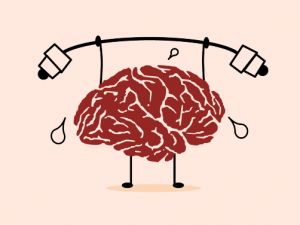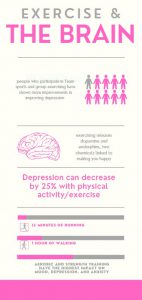by: Reagan Crichton
There are a lot of valid reasons behind why someone should exercise. There are also a lot of reasons behind why each person decides to start their journey. For the most part, people don’t usually think about the internal benefits they get from exercising unless their doctor informs them of it, people usually think about the long run and how they want to end up looking. Wanting to look better is a valid reason behind why you are physically active, but internal motivators and effects are far more important. We never truly stop and question or think about what does happen to us on the inside during and after exercise, specifically to the brain. When exercising your heart rate and blood flow will both increase allowing your brain access to more oxygen, nutrients, and proteins. It is proven that exercise is linked to mood improvement. It is found that major depression can decrease by 26% by just walking for an hour a day or running for only 15 minutes. (Penttila, N. 2020)
Aerobic exercises and strength training are both linked to helping treat depression, but people who participate in “team” or group exercises have seen even better results. UCO does a great job at providing both things to all students. The Wellness Center provides multiple group classes throughout the week, in-person and online options are both available. Group fitness classes allow you to be social and interact with other people who have similar goals to you as well. There was a research study conducted by Bryne & Bryne (2006) that found the majority of studies support both the anti-depressive properties of exercise and the effect of exercising in combatting anxiety. Meaning exercise helps with not only depression but anxiety and many other normal disorders (Bryne and Bryne 2006)
When you exercise and your brain has access to all these extra things, it releases chemicals into our brain. The two major chemicals that get released are dopamine and endorphins, both of these things are proven to make you feel happy. While your own body is already releasing these feel-good chemicals, you are also doing yourself a favor and quite literally working off “some steam”. Your body not only creates and releases chemicals into your brain, but it also discards any “bad” chemicals. The bad chemicals in reference can be linked to causing added stress and anxiety. (Robinson) having these released will mean that you will finish your workout in a better mood and in a better headspace than where you started.
References
Byrne, A., & Byrne, D. (2002, May 28). The effect of exercise on depression, anxiety and other mood states: A review. Retrieved March 01, 2021, from https://www.sciencedirect.com/science/article/pii/002239999390050P
Penttila, N. (2020, March 24). How does exercise affect the brain? Retrieved March 01, 2021, from https://www.dana.org/article/how-does-exercise-affect-the-brain/
Robinson, L. (n.d.). The mental health benefits of exercise. Retrieved March 01, 2021, from https://www.helpguide.org/articles/healthy-living/the-mental-health-benefits-of-exercise.htm
Mental Health Brain Training Mind – Free image on Pixabay
*All images were stated as free for use by student author

